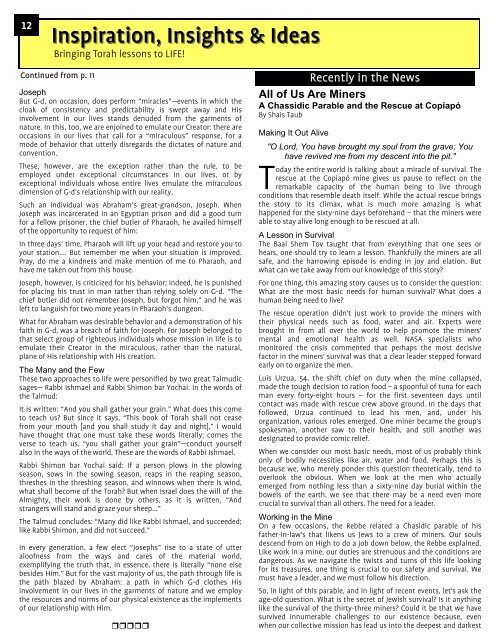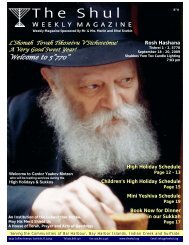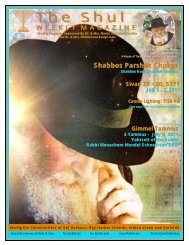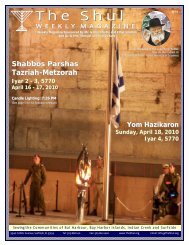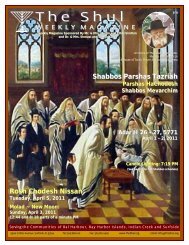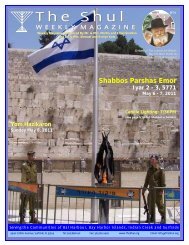You also want an ePaper? Increase the reach of your titles
YUMPU automatically turns print PDFs into web optimized ePapers that Google loves.
12<br />
Inspiration, Insights & Ideas<br />
Bringing Torah lessons to LIFE!<br />
Continued from p. 11 Recently in the News<br />
Joseph<br />
But G-d, on occasion, does perform “miracles”—events in which the<br />
cloak of consistency and predictability is swept away and His<br />
involvement in our lives stands denuded from the garments of<br />
nature. In this, too, we are enjoined to emulate our Creator: there are<br />
occasions in our lives that call for a “miraculous” response, for a<br />
mode of behavior that utterly disregards the dictates of nature and<br />
convention.<br />
These, however, are the exception rather than the rule, to be<br />
employed under exceptional circumstances in our lives, or by<br />
exceptional individuals whose entire lives emulate the miraculous<br />
dimension of G-d’s relationship with our reality.<br />
Such an individual was Abraham’s great-grandson, Joseph. When<br />
Joseph was incarcerated in an Egyptian prison and did a good turn<br />
for a fellow prisoner, the chief butler of Pharaoh, he availed himself<br />
of the opportunity to request of him:<br />
In three days’ time, Pharaoh will lift up your head and restore you to<br />
your station.... But remember me when your situation is improved.<br />
Pray, do me a kindness and make mention of me to Pharaoh, and<br />
have me taken out from this house.<br />
Joseph, however, is criticized for his behavior; indeed, he is punished<br />
for placing his trust in man rather than relying solely on G-d. “The<br />
chief butler did not remember Joseph, but forgot him,” and he was<br />
left to languish for two more years in Pharaoh’s dungeon.<br />
What for Abraham was desirable behavior and a demonstration of his<br />
faith in G-d, was a breach of faith for Joseph. For Joseph belonged to<br />
that select group of righteous individuals whose mission in life is to<br />
emulate their Creator in the miraculous, rather than the natural,<br />
plane of His relationship with His creation.<br />
The Many and the Few<br />
These two approaches to life were personified by two great Talmudic<br />
sages— Rabbi Ishmael and Rabbi Shimon bar Yochai. In the words of<br />
the Talmud:<br />
It is written: “And you shall gather your grain.” What does this come<br />
to teach us? But since it says, “This book of Torah shall not cease<br />
from your mouth [and you shall study it day and night],” I would<br />
have thought that one must take these words literally; comes the<br />
verse to teach us, “you shall gather your grain”—conduct yourself<br />
also in the ways of the world. These are the words of Rabbi Ishmael.<br />
Rabbi Shimon bar Yochai said: If a person plows in the plowing<br />
season, sows in the sowing season, reaps in the reaping season,<br />
threshes in the threshing season, and winnows when there is wind,<br />
what shall become of the Torah? But when Israel does the will of the<br />
Almighty, their work is done by others, as it is written, “And<br />
strangers will stand and graze your sheep...”<br />
The Talmud concludes: “Many did like Rabbi Ishmael, and succeeded;<br />
like Rabbi Shimon, and did not succeed.”<br />
In every generation, a few elect “Josephs” rise to a state of utter<br />
aloofness from the ways and cares of the material world,<br />
exemplifying the truth that, in essence, there is literally “none else<br />
besides Him.” But for the vast majority of us, the path through life is<br />
the path blazed by Abraham: a path in which G-d clothes His<br />
involvement in our lives in the garments of nature and we employ<br />
the resources and norms of our physical existence as the implements<br />
of our relationship with Him.<br />
<br />
All of Us Are Miners<br />
A Chassidic Parable and the Rescue at Copiapó<br />
By Shais Taub<br />
Making It Out Alive<br />
"O Lord, You have brought my soul from the grave; You<br />
have revived me from my descent into the pit."<br />
T<br />
oday the entire world is talking about a miracle of survival. The<br />
rescue at the Copiapó mine gives us pause to reflect on the<br />
remarkable capacity of the human being to live through<br />
conditions that resemble death itself. While the actual rescue brings<br />
the story to its climax, what is much more amazing is what<br />
happened for the sixty-nine days beforehand – that the miners were<br />
able to stay alive long enough to be rescued at all.<br />
A Lesson in Survival<br />
The Baal Shem Tov taught that from everything that one sees or<br />
hears, one should try to learn a lesson. Thankfully the miners are all<br />
safe, and the harrowing episode is ending in joy and elation. But<br />
what can we take away from our knowledge of this story?<br />
For one thing, this amazing story causes us to consider the question:<br />
What are the most basic needs for human survival? What does a<br />
human being need to live?<br />
The rescue operation didn't just work to provide the miners with<br />
their physical needs such as food, water and air. Experts were<br />
brought in from all over the world to help promote the miners'<br />
mental and emotional health as well. NASA specialists who<br />
monitored the crisis commented that perhaps the most decisive<br />
factor in the miners' survival was that a clear leader stepped forward<br />
early on to organize the men.<br />
Luis Urzua, 54, the shift chief on duty when the mine collapsed,<br />
made the tough decision to ration food – a spoonful of tuna for each<br />
man every forty-eight hours – for the first seventeen days until<br />
contact was made with rescue crew above ground. In the days that<br />
followed, Urzua continued to lead his men, and, under his<br />
organization, various roles emerged. One miner became the group's<br />
spokesman, another saw to their health, and still another was<br />
designated to provide comic relief.<br />
When we consider our most basic needs, most of us probably think<br />
only of bodily necessities like air, water and food. Perhaps this is<br />
because we, who merely ponder this question theoretically, tend to<br />
overlook the obvious. When we look at the men who actually<br />
emerged from nothing less than a sixty-nine day burial within the<br />
bowels of the earth, we see that there may be a need even more<br />
crucial to survival than all others. The need for a leader.<br />
Working in the Mine<br />
On a few occasions, the Rebbe related a Chasidic parable of his<br />
father-in-law's that likens us Jews to a crew of miners. Our souls<br />
descend from on High to do a job down below, the Rebbe explained.<br />
Like work in a mine, our duties are strenuous and the conditions are<br />
dangerous. As we navigate the twists and turns of this life looking<br />
for its treasures, one thing is crucial to our safety and survival. We<br />
must have a leader, and we must follow his direction.<br />
So, in light of this parable, and in light of recent events, let's ask the<br />
age-old question. What is the secret of Jewish survival? Is it anything<br />
like the survival of the thirty-three miners? Could it be that we have<br />
survived innumerable challenges to our existence because, even<br />
when our collective mission has lead us into the deepest and darkest


